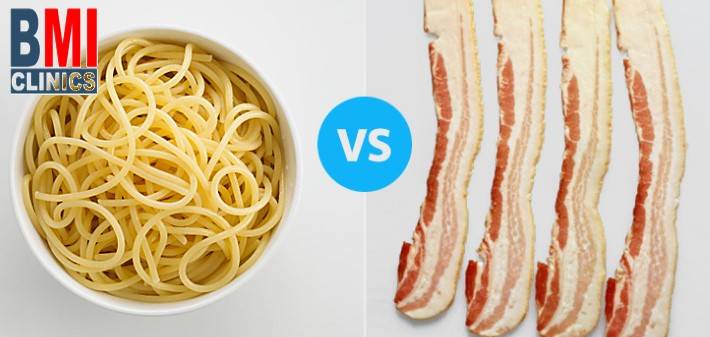Among the many types of weight loss diets available, there are those that are low in carbohydrates and low in fat. Even for those who are trying to shed few pounds, low fat diets or low carb diets can be very beneficial due to various health reasons. Each of the two options has its merits and demerits. The right choice for each person often lies in his or her lifestyle and preference.
Definition of low fat diets and low carb diets
There are no clear and widely accepted definitions of low-carb and low fat diets. However, there are general guidelines that can be followed. According to Today’s Dietitian, low carb diets contains 30-100 grams of carbs every day. In 2012, the American Journal of Epidemiology defined low carb diets as those that supply less than 45% of one’s daily calories from carbs; this is less than 225 grams when consuming 2,000 calories daily. Lastly, a study in the 2014 issue of Annals of Internal Medicine described low fat diets as those that derive less than 30% of calories from fats, an equivalent of 67 grams of fat per day in a 2,000-calorie plan.
Weight Loss
Many studies show low carb diets as being more effective in dealing with fat loss and weight loss than low fat diets. The study published in Annals of Internal Medicines in 2014 affirmed this in its publication of a 12-month prospective research. Participants were found to consume less than 40 grams of carb per day when they followed low carb diets and consumed fewer than 30% of calories from fat as they followed low fat diets.
Other studies have presented research that show that low fat diets can also be beneficial in shedding pounds. Both low fat diets and low carb diets can result in significant weight losses; this was demonstrated by a study featured in the 2012 issue of the American Journal of Epidemiology. Therefore, whichever diet a person can maintain on a long-term basis and will allow him to reduce his overall caloric intake, will be the best option for weight loss.
Cholesterol
Because of low-carb and low fat diets aiding in weight loss, the diets also help to reduce the risk of diseases. Low carb diets have been found to be more beneficial in decreasing disease risks. Researchers in the 1980s found a direct correlation between the increase in levels of cholesterol and the consumption of saturated fats. Increased cholesterol in the body can lead to heart disease. More recent research have however shown a contradiction, revealing that saturated fats do not always cause increased cholesterol level, and some foods have the opposite effect.
A recent study featured in the American Journal of Epidemiology concluded that low carb diets lower cholesterol levels more than low fat diets. The low-carb group did not avoid saturated fats; they had plenty of meat, butter, and cheese. Surprisingly body weight, waist circumference and other metabolic risk factors between the two groups had no significant differences.
Triglycerides
Triglycerides are simply a fat lipid present in the blood. After eating, anything the body will fall to convert to calories will be converted into triglycerides, which is stored in the fat cells. High triglycerides levels contribute to the risk of stroke, heart disease and heart attack. This is because the artery walls harden in the presence of cholesterol and triglycerides. Just as in cholesterol, low carb diets reduce triglycerides more than low-fat ones.
Insulin sensitivity and insulin resistance
Insulin sensitivity is how sensitive a person’s body is to insulin. An insulin sensitive individual requires less insulin in lowering high blood sugar level than another having a low sensitivity. Individuals with low sensitivity are more insulin resistant and, therefore, need larger amounts of insulin from their pancreas. Low sensitivity (insulin resistance) is a pre-diabetes state, and may increase the risk of various health problems such as high blood pressure, cancer, obesity, and heart failure. Low carb diets have shown improvements in insulin sensitivity, whether low fat diets did not.
Recommendations
- Personal preference is usually the driving force behind whether a low-carb or low-fat diet is easier to maintain for long-term purposes.
- For people looking to lose weight, intake of plenty of fiber- and protein-rich foods will help them in not only boosting satiety but also easily enabling them to lower their overall caloric intake.
- Those who regularly workout, should avoid eating few carbs as it could lead to a decrease in athletic performance and fatigue.
- Low carb diets are good for individuals suffering from pre-diabetes or diabetes; however, it is important first to consult your doctor.









